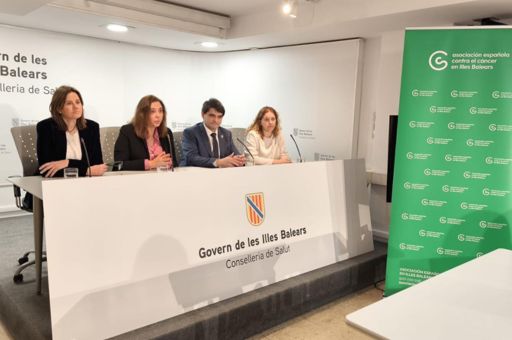AECC volunteers will provide information on the benefits of participating in the programme to increase the number of people who voluntarily undergo screening tests.
The Early Detection of Colon and Rectal Cancer Programme of the Balearic Islands invited 129,839 people between the ages of 50 and 69 to participate in 2024.
The Councillor for Health, Manuela García, has signed an agreement with the regional president of the Spanish Association Against Cancer, José Reyes, for volunteers from the organisation to help in the development of the colon and rectum cancer screening programme.
TDB keeps you informed. Follow us on: Facebook, Twitter and Instagram
Salut signs a collaboration agreement with the AECC to raise awareness about participation in the programme for the early detection of colon and rectal cancer
Part of the AECC volunteers, previously trained by technicians from the Directorate General of Public Health, will make telephone contact with people from the target population who either have not received the letter of invitation or, having received it, have not been screened for faecal occult blood. The aim is to raise awareness of the benefits of participating in this programme and to increase the number of people who voluntarily undergo screening tests.
On the occasion of World Colon Cancer Day, which is celebrated on 31 March, the councillor Manuela García thanked the AECC for its support and the ‘admirable work carried out by the organisation’s volunteers’. She also stressed the importance of taking advantage of this opportunity for prevention and detection, encouraging the target population to get tested when they receive the invitation, as ‘early detection in the case of colon cancer can increase survival by 90%’.
For his part, the regional president of the Spanish Association Against Cancer, José Reyes thanked the Regional Ministry of Health for its commitment and vision in this pioneering initiative at a national level: ‘Thanks to this agreement, we will be able to strengthen participation in the prevention programme, directly reaching people who either have not received the invitation letter or, having received it, have not been screened for faecal occult blood. Early detection of colon cancer is possible and everyone’s participation is essential to improve the prognosis of the most common cancer in the Balearic Islands’. He also made ‘a special acknowledgement to the Association’s volunteers, whose effort and dedication will be fundamental to the success of this activity, making an invaluable contribution to the wellbeing of our community’.
Colon cancer was the second most common cancer in the Balearic Islands in 2024, in both men and women. It is an uncommon type of cancer before the age of 50, with the highest incidence occurring around the age of 60. It is a tumour that originates from an abnormal and uncontrolled growth of cells in the colon or rectal area of the large intestine and does not usually present symptoms until it is very advanced.
Hence the importance of early detection, which allows these polyps to be removed before they degenerate into malignant tumours. Detecting colorectal cancer at an early stage allows for more effective treatment.
The Early Detection of Colon and Rectal Cancer Programme of the Balearic Islands (PDPCCR) began in 2015 and will be extended to 100% of the population by 2022. It is one of the most effective screening programmes due to its high capacity for early detection of this pathology using the faecal occult blood test (FOBT). Not only are existing lesions identified early, but polyps are prevented from developing into malignant tumours.
Last year, 129,839 people between the ages of 50 and 69 were invited to participate in the programme. 1,484 had a positive faecal occult blood test. After colonoscopy, the results were as follows:
- 29% had no lesions and were considered to have normal colonoscopies.
- 21% were found to have low-risk lesions, 24% medium-risk lesions, 22% high-risk lesions, and 3% cancer.
